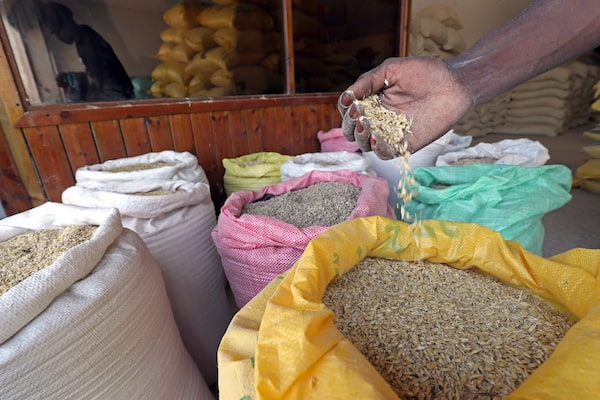
A man shops for wheat at a grain market in Libya's capital Tripoli on July 22.MAHMUD TURKIA/AFP/Getty Images
Some of the biggest stories in the world are not, it would seem, about wars or elections. They are about food.
In Nigeria, for example, there has been panic, hoarding and warnings of mass malnutrition as the cost of the country’s staple dish, jollof rice, more than doubled for many, accelerated by a 61-per-cent increase in the year-over-year price of rice. In Indonesia, a sudden near-doubling has raised the grain’s retail price to the highest level since 2008, forcing the government to spend heavily to subsidize food supplies. In Egypt and neighbouring Arab countries, where wheat and corn are staples, a sudden upsurge in prices has led to fears of starvation and political destabilization.
If you look a bit closer, those food crises are indeed about wars and elections.
This year’s grain shortages and price spikes are overwhelmingly political. While weather, climate and shifting demand play a secondary role, the world nevertheless has more than enough grain and food staples for everyone in Africa, Asia and the Middle East – if it were not for self-interested political decisions turning a globalized food market into a set of national islands.
The rice emergencies are caused largely by a decision made this year by Indian Prime Minister Narendra Modi, whose country is by far the world’s largest rice exporter, to ban the foreign sale of all forms of rice except basmati (which is considered an unaffordable luxury variety in most of the world).
That decision was reportedly made to keep rice prices unnaturally low for Indian consumers in advance of this year’s state elections and next year’s national election. It was devastating to Indian farmers. “The government doesn’t value the hard work of farmers,” northern Indian rice farmer Satish Kumar told the Financial Times. “It has its eye on elections and doesn’t want the rice prices to go up.”
In response, Thailand and Vietnam, the world’s second- and third-largest rice exporters, imposed their own export restrictions; panic-buying and hoarding ensued in other markets, all of which drove worldwide prices upward. Even in Canada, as reporter Tanushi Bhatnagar wrote in The Globe this month, the doubling of rice prices is hurting restaurants and consumers. In Africa and Asia, it’s threatening lives.
A similar election-driven move hit wheat and corn prices this year. In May, Poland’s then-governing far-right Law and Justice Party closed its eastern border to Ukrainian grain exports. In contrast to India’s, Warsaw’s ban was imposed in order to keep prices unnaturally high to benefit Polish farmers (whose votes had been key to the party’s hold on power).
The Polish ban (combined with similar bans in Slovakia and Hungary, supported until September by the European Union) was theoretically meant to apply only to the Polish market, not to grain shipments in transit to Western Europe, Africa and the Middle East. But the intensive border checks and controls imposed by Warsaw made exports much slower, more difficult and considerably more expensive. When Ukraine complained in September, the Law and Justice government declared that it would end arms exports to the Ukrainian military and aid to refugees.
Poland’s Oct. 15 election brought a much more democratically minded government to power, and will likely result in an end to the Ukrainian grain ban. But trade export routes will still have to contend with limitations on the movement of Eastern European grain thanks to earlier efforts from a malign political actor.
On July 17, the government of Russian President Vladimir Putin announced that it would not renew the Black Sea Grain Initiative, a deal reached after lengthy negotiation in July of 2022, in which Mr. Putin had agreed not to attack ships carrying Ukrainian grain through the Black Sea en route to world markets (in exchange, shipments of Russian grain and food would also be allowed to traverse the Black Sea, in an effective exemption to widely imposed embargoes).
The Black Sea route had been especially important for markets in the Middle East and Africa, which are overwhelmingly dependent on Ukrainian and Russian grain – according to European data, almost two-thirds of the wheat and more than half the corn exported from Ukraine was destined for developing countries. The closure of the Black Sea (combined with the still-restricted European land borders) led to a global spike in grain prices, but also to a far larger supply and price crisis in countries such as Egypt and Sudan.
Attacks on globalization are an established play of the sort of right-wing populist leaders we see in India, Russia and (until last month) Poland. Those attacks tend to be hardest on their own citizens. Food, however, is a special case – a commodity that vitally needs to be global in supply, and is dangerously expensive when it’s not. For the price of a few votes, millions of lives can be threatened.
 Doug Saunders
Doug Saunders